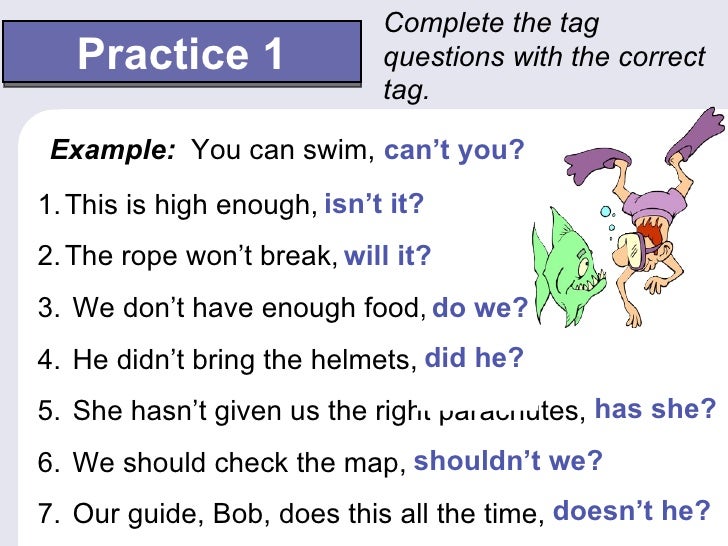TRES REGLAS BASICAS QUE DEBES RECORDAR
| |
1.
|
Los tag questions utilizan siempre los verbos auxiliares.
|
2.
|
Con oraciones afirmativas utilizamos un tag question en NEGATIVO.
|
3.
|
Con oraciones negativas utilizamos un tag question en AFIRMATIVO o POSITIVO.
|
a) ORACIONES AFIRMATIVAS CON EL VERBO TO BE EN PRESENT SIMPLE O CONTINUO.
|
Se utiliza la misma forma del verbo en NEGATIVO:
|
|
UNICAMENTE en este caso en particular, para la primera persona del verbo to be se utiliza aren't I? como equivalente de am I not?:
|
I'm late, aren't I? (Llego tarde, ¿no?)
I'm arriving late at night, aren't I? (LLegaré tarde por la noche, ¿no?) |
b) ORACIONES NEGATIVAS CON EL VERBO TO BE EN PRESENT SIMPLE O CONTINUO.
|
Se utiliza la misma forma del verbo en AFIRMATIVO o POSITIVO:
|
|
c) ORACIONES AFIRMATIVAS CON EL VERBO TO BE EN PAST SIMPLE O CONTINUO.
|
Se utiliza la misma forma del verbo en NEGATIVO:
|
It was a beautiful day, wasn't it? (Fue un día hermoso, ¿verdad?)
Martha was angry, wasn't she? (Marta estaba enojada, ¿no?) You were really tired, weren't you? (Estabas muy cansado, ¿verdad?) You were studying at 6, weren't you? (Estuviste estudiando a las 6, ¿no?) He was flying when I phoned, wasn't he? (Estaba volando cuando llamé, ¿no?) |
d) ORACIONES NEGATIVAS CON EL VERBO TO BE EN PAST SIMPLE O CONTINUO.
|
Se utiliza la misma forma del verbo en AFIRMATIVO o POSITIVO:
|
|
e) ORACIONES AFIRMATIVAS CON OTROS VERBOS COMUNES O DEFECTIVOS.
|
Teniendo siempre en cuenta el TIEMPO VERBAL, se utiliza el auxiliar en NEGATIVO que corresponde a la persona de la oración:
didn't she? hasn't she? won't she? shouldn't she? can't she? couldn't she? aren't there? |
 |



